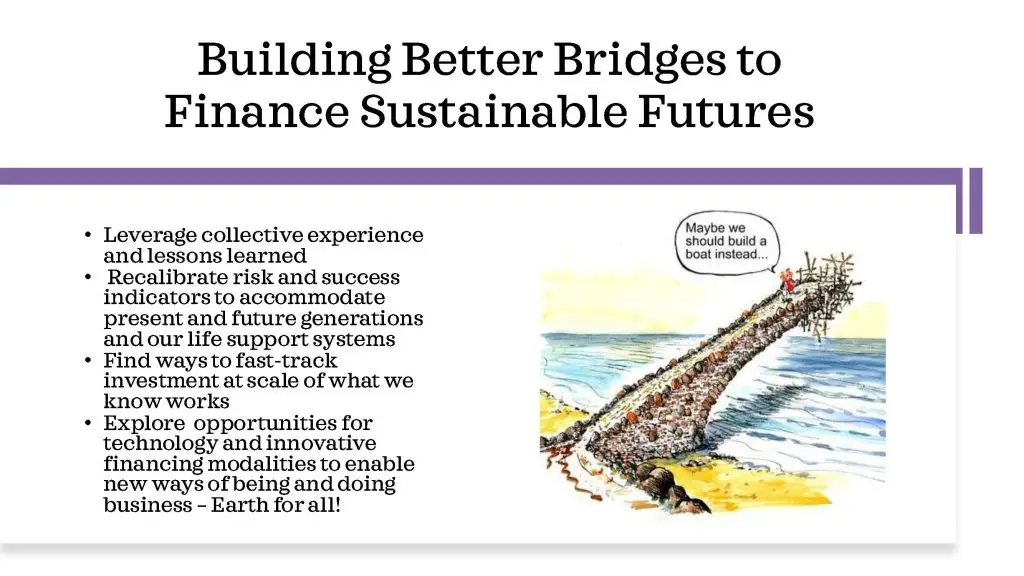This GRFC workshop brought together leading experts, practitioners, and policymakers to explore methods, metrics, and business models for sustainable development. Through dynamic discussions and case studies, participants examined how to accelerate the transition towards a redistributive, regenerative, and restorative global economy.
Morning Session: Methods and Metrics for Sustainable Development
The morning focused on practical tools and approaches for assessing and advancing sustainability. Using “speed dating” presentations, panellists showcased innovative frameworks and opportunities for large-scale investment in agro-ecology.
Key Insights
- Innovation Systems – Peter Bucher highlighted the need for integrated frameworks that connect actors from local to global levels, with landscape planning as a critical strategy.
- Agro-Ecology Framework – Matt Purkis and Greg Jones introduced this model as a tool for food system transformation, promoting regenerative, climate-resilient practices.
- Enabling Communities – Rafal Serafin emphasised building supportive environments for food, water, waste, and energy communities through authentic multi-stakeholder partnerships.
- Agri-Hubs and Centres of Excellence – Kim Russell challenged assumptions about absorptive capacity, stressing their role in scaling innovation.
- Balancing Nature and Society – Discussions underscored the importance of aligning ecological sustainability with social equity and economic resilience.
Re-calibrating Risk and Metrics
The session also tackled performance measurement and risk assessment in transformational agendas:
- Dr. Marlene Laeubli addressed the challenges of embedding systemic change.
- Dr. Christian Kingombe, Professor Chris Roche, Dr. Linda Kelly, Dag Messelt, and John Ashcroft explored diverse approaches to sustainability reporting.
- John Ashcroft presented the benefits of relational metrics, such as early risk identification, diagnosing systemic weaknesses, and supporting professional development.

Afternoon Session: Models and Modalities for Transformation
The afternoon discussions centred on scalable business models and financing modalities that can drive systemic change towards a regenerative economy.
Proven and Prospective Business Models
Panelists presented examples of multi-impact initiatives across regions:
- Wietse Hermanns highlighted projects in Europe on water, waste, food systems, and sustainable construction.
- Matt Purkis shared initiatives in Southern Africa, from rewilding to clean-tech innovation.
- Kim Russell and Mehmet Bozkurt discussed nature-based solutions and sustainable energy across Australia and the Indo-Pacific.
- Lawrence Kirton demonstrated the role of Special Purpose Vehicles in supporting regeneration.
Plenary discussions identified critical success factors for scaling these models globally.
Financing Modalities
Financing the transition remains a key challenge.
- Karen Fawcett stressed the need for reform in the financial system, clearer communication on carbon standards, and development of the still-immature nature-based solutions market.
- Contributions from Zander van der Walt, Patricia Chikukwa, Rafal Serafin, and Wietse Hermanns explored patient capital, lessons from African banking, community foundations, and financing for peacebuilding.
- Professor Tony Wong provided insights into public financing for Small Island States, underlining the importance of resilience financing.
Calls to Action
The workshop concluded with clear priorities for Building Bridges Week 2024 and beyond:
- Prioritise investment in social capital and cooperative approaches.
- Re-evaluate policies and practices to better support sustainable development.
- Adopt integrative methods and metrics for assessing and fostering sustainability.
- Develop and scale multi-impact business models that advance climate resilience and equity.
- Innovate financing modalities to support a redistributive and regenerative economy.
- Improve communication and strengthen carbon standards for nature-based solutions.
- Merge voluntary and compliance carbon markets.
- Increase funding for large-scale, high-impact projects.
Towards a Sustainable and Equitable Future
This workshop was a crucial step towards building a shared understanding of the opportunities and barriers to systemic change. By combining new frameworks, proven models, and innovative financing solutions, participants reinforced a common goal: a sustainable global economy that is equitable, regenerative, and future-fit.
See the presentations
Innovation systems
Make companies act
Moving the needle: promising practices
Making it work for nature
